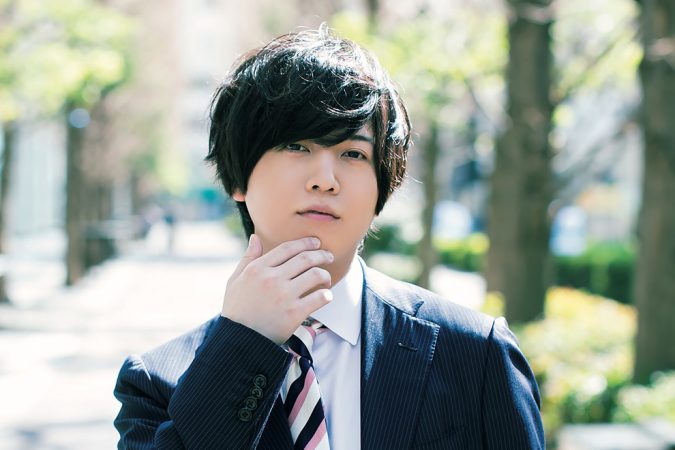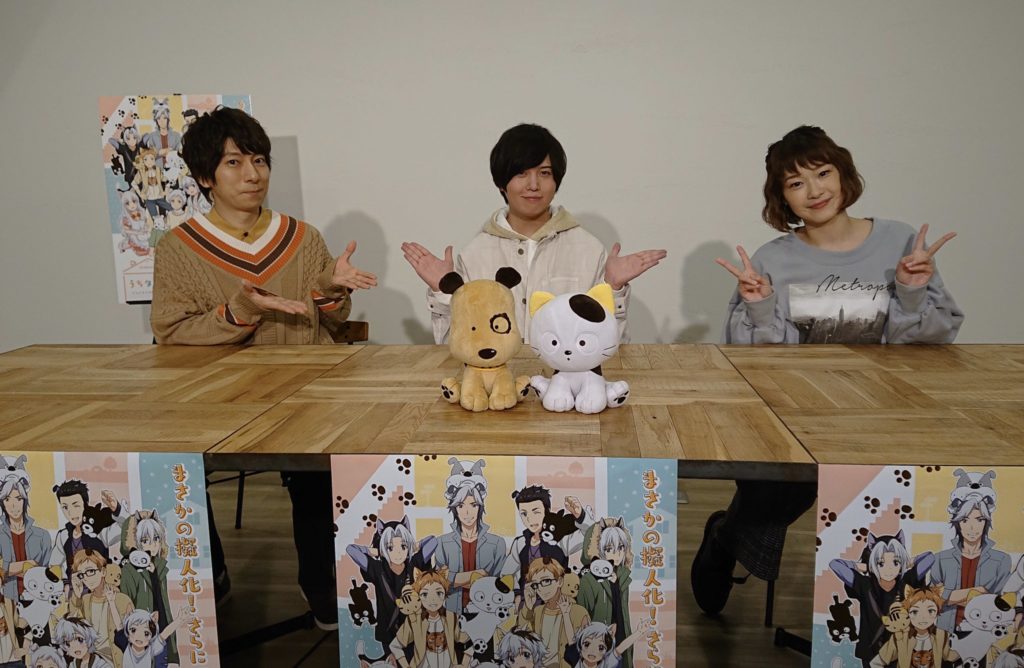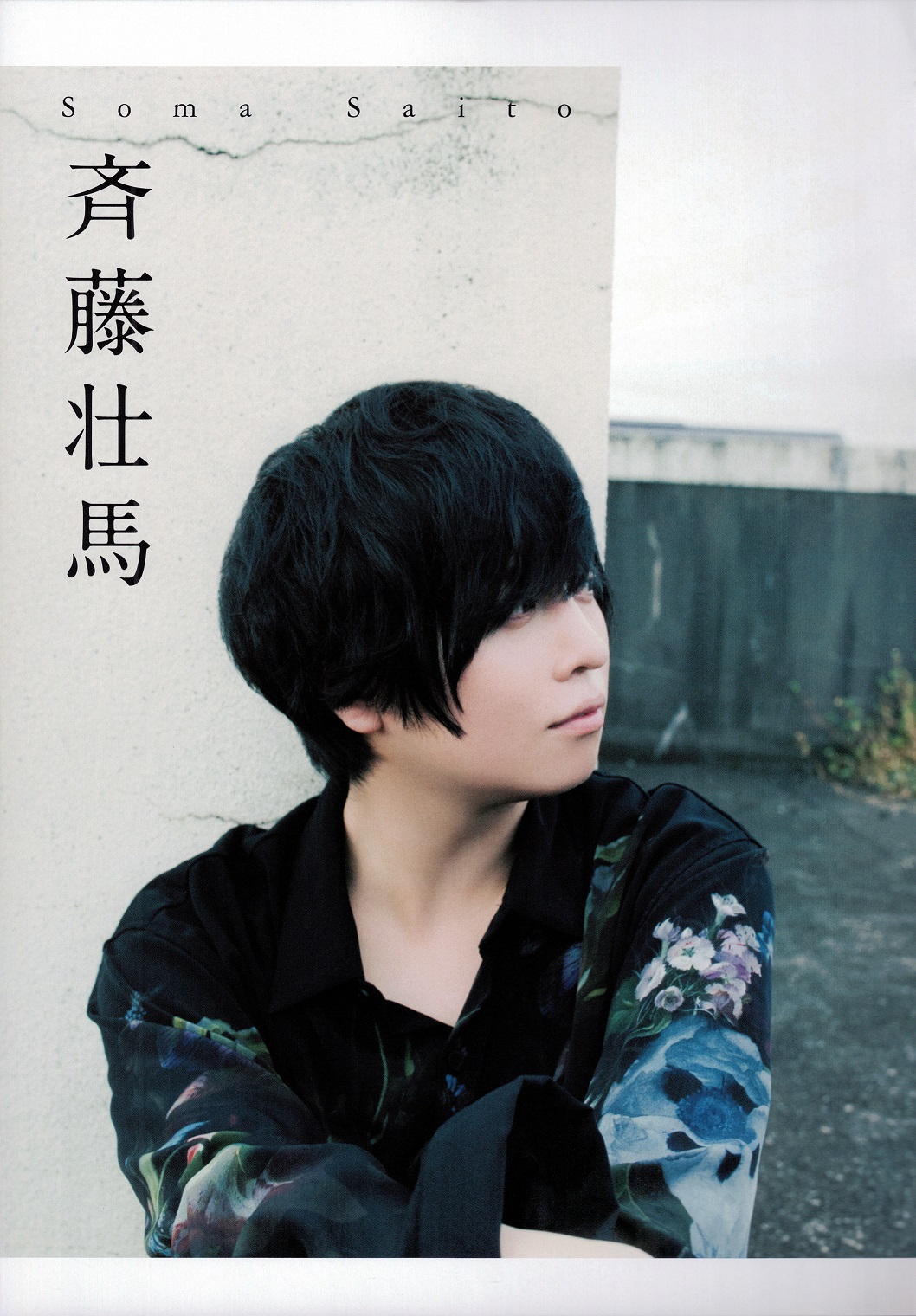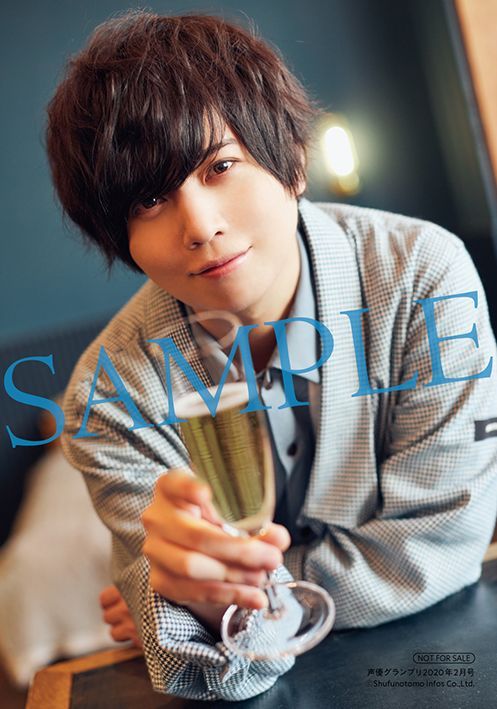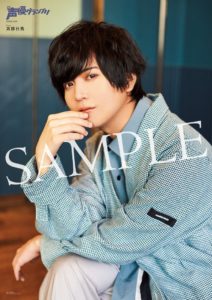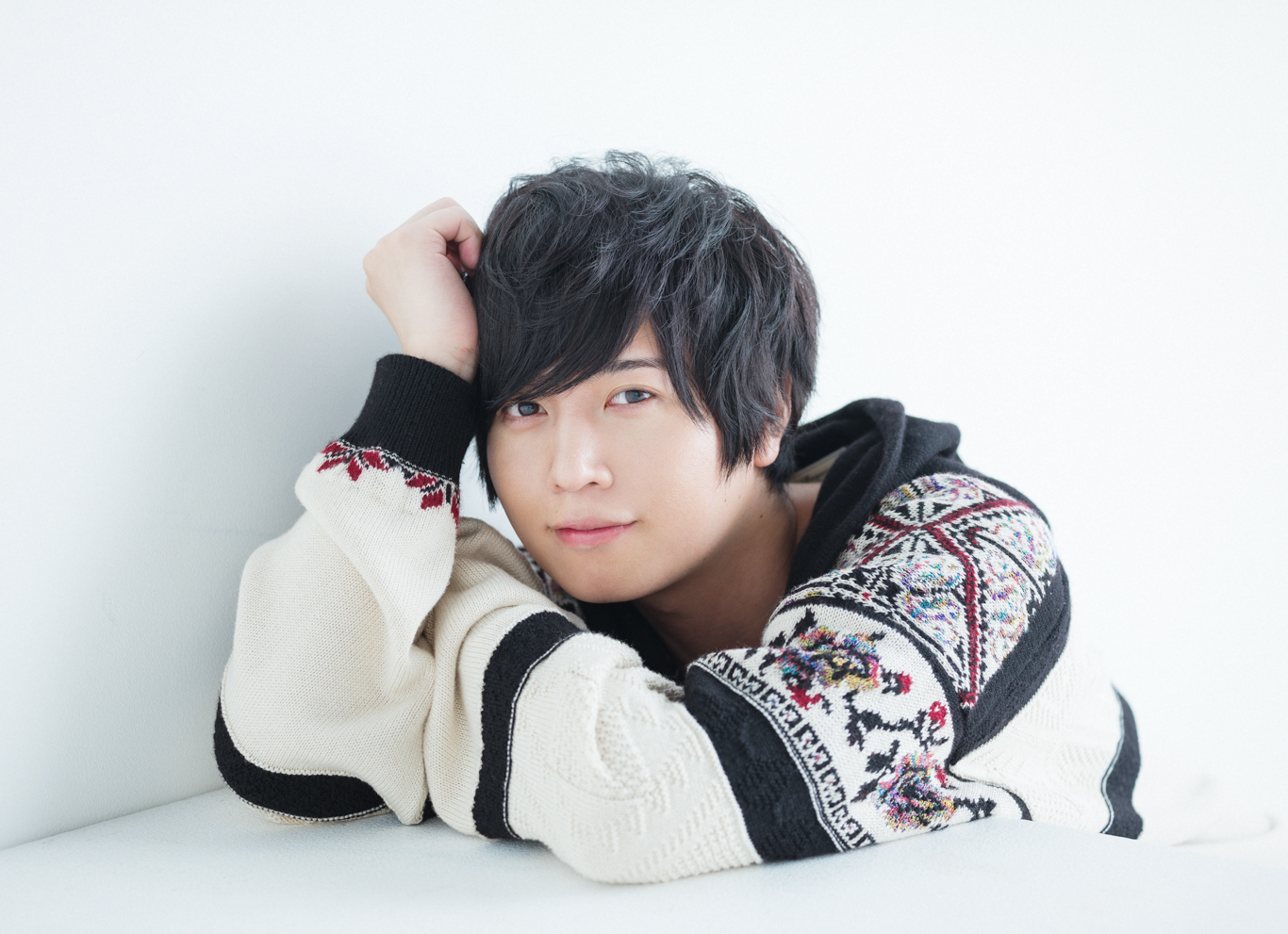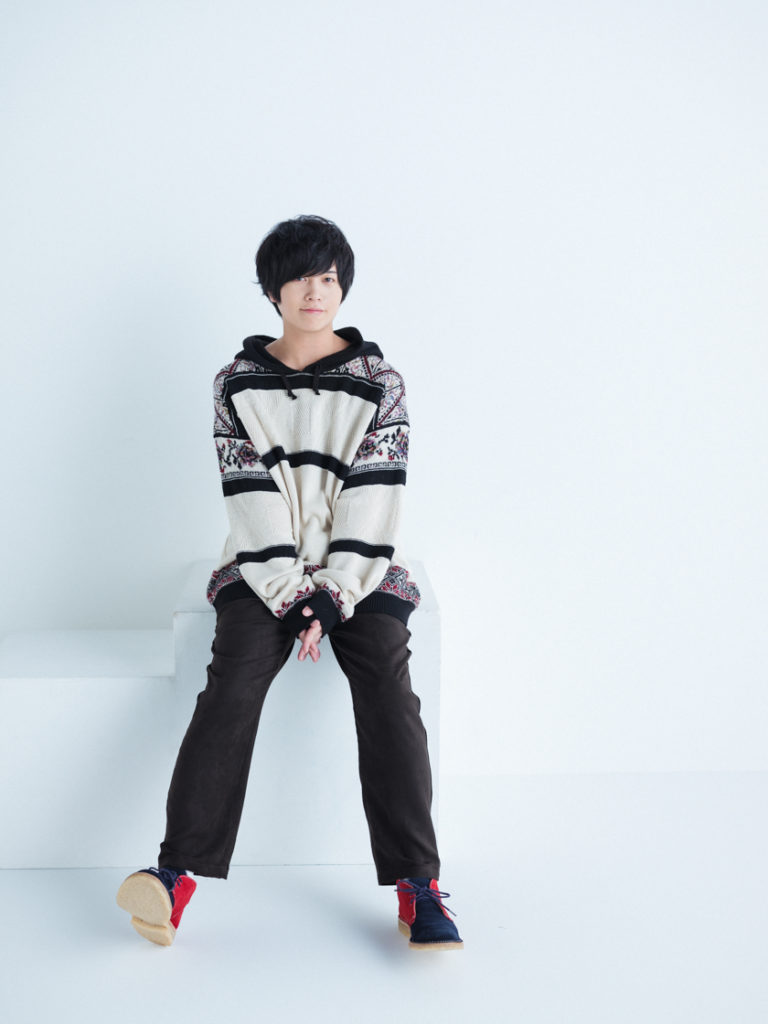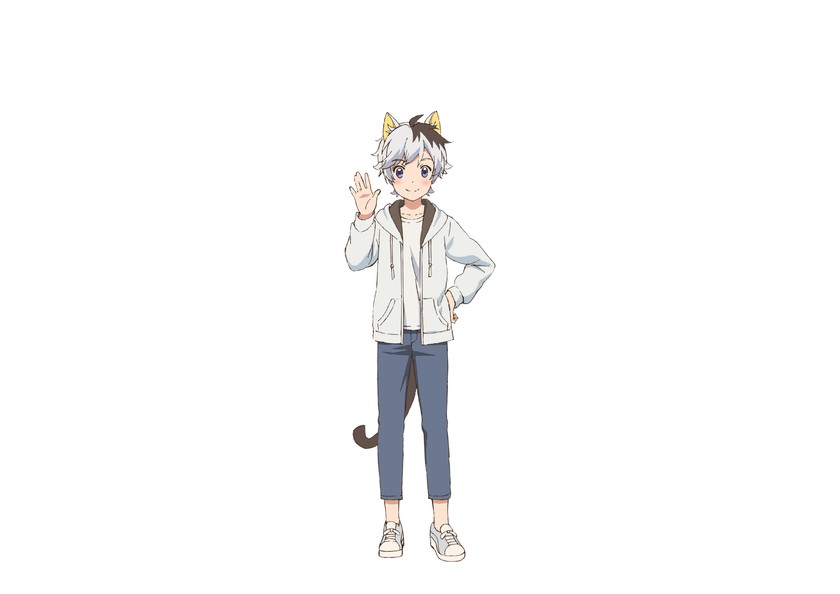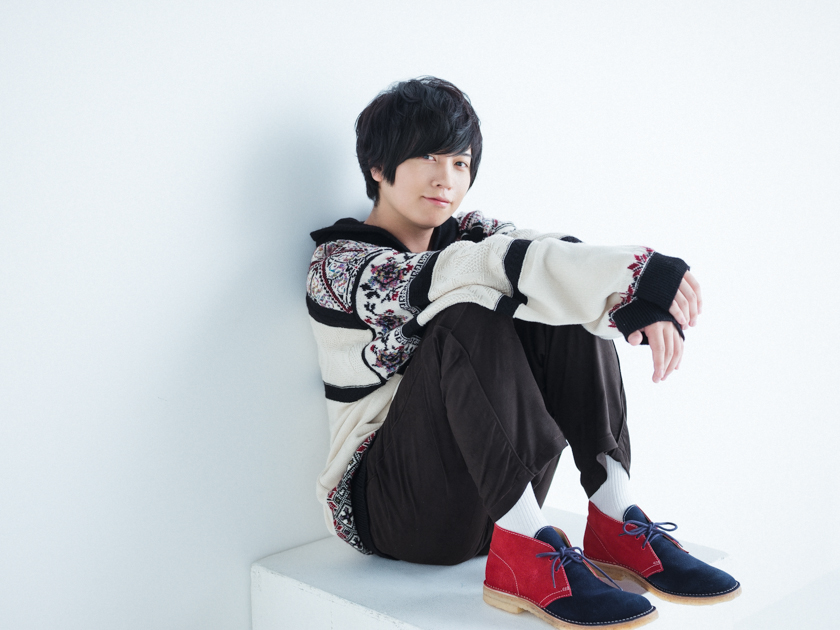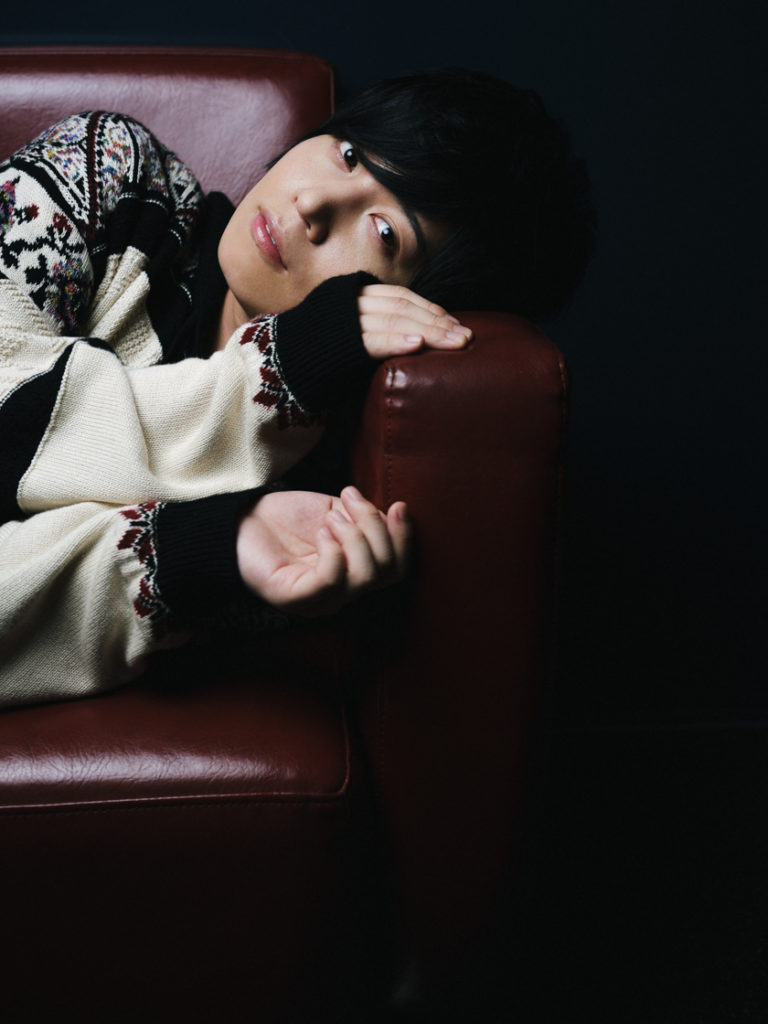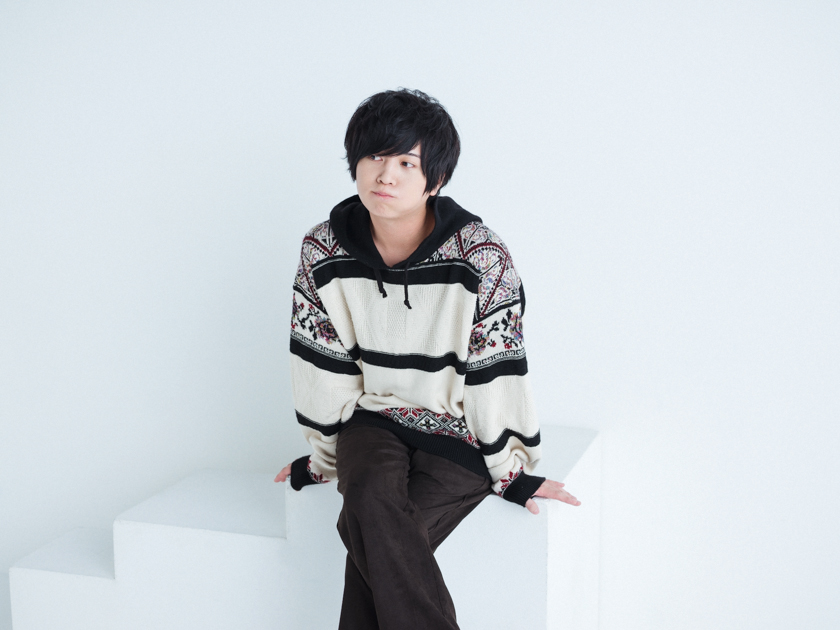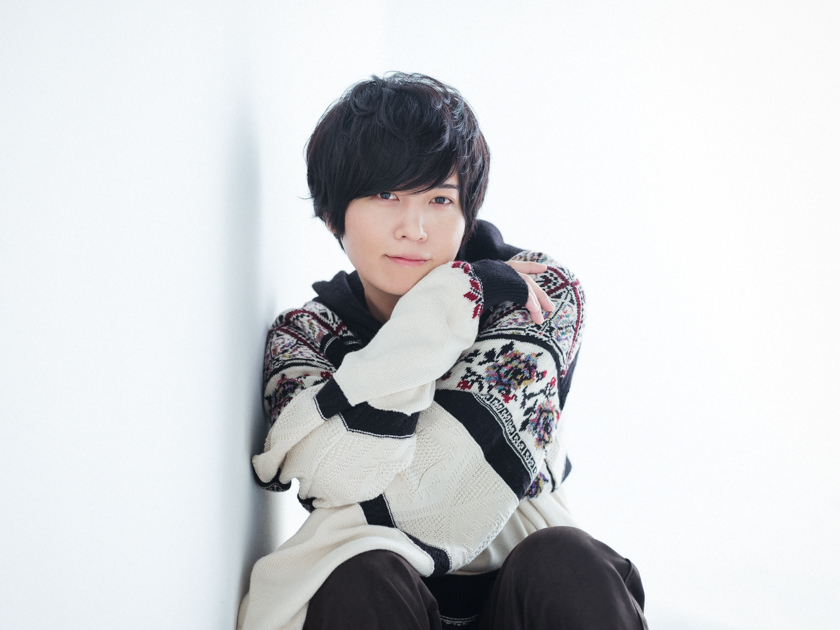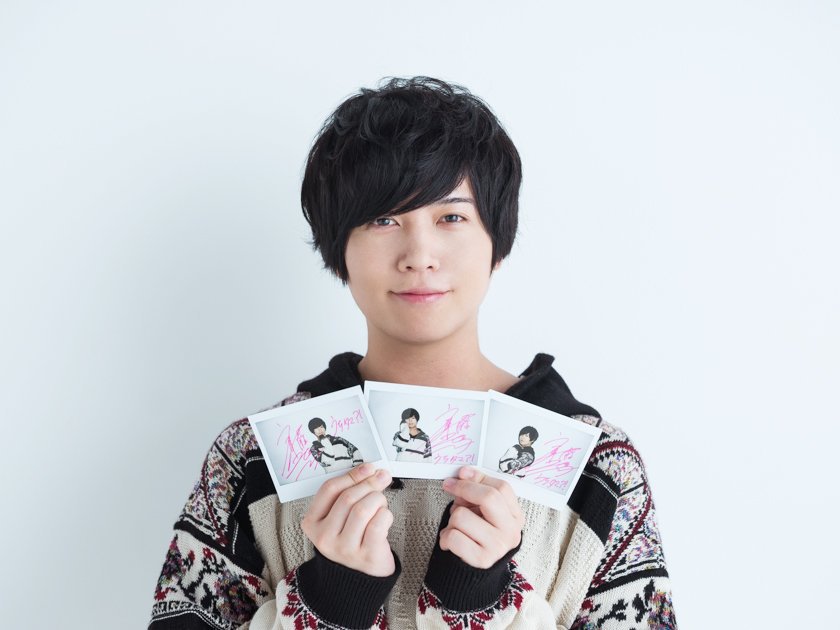Tagline: Kimi-iro ni Somaritai (I want to be dyed your colour)
Released: 2020/1/10
※Soma was on the front page cover and had a 12-page feature. There was also a pin-up poster as well as several shop-specific bonuses (3 bromides and a poster).
(There are a lot of great Soma pictures in this magazine, but I won’t be posting scans because a digital version is available at sites like Bookwalker.)
An EP resembling what comes after the end of Season 1
Q: First, please tell us about how this EP came to be.
I released my first album one year ago and held a concert in Feburary, and at that point, I felt that I’d finished the “1st season.” After performing with a live band, I also felt that I really enjoyed making music with that team. Up until then, I’d constantly been outputting ideas, and I realized that in order to keep having fun with that team, I’d need time for input as well… so I chose to wait for a while.
Q: So, this EP is the start of the long-awaited 2nd season.
To be honest, I wanted to resume my musical activities sooner *laughs*. I had various structural ideas, like whether I wanted it to be an album or a single, but when I looked at how many songs I had in mind, I saw that it was the right number for an EP. Also… isn’t the word “EP” itself cool? *laughs*
Q: It does have a nice ring to it *laughs*
I’m a fan of the book Summer Vacation EP by Furukawa Hideo, and at first I was thinking of naming this CD “Blue Vacation EP.” However, I ended up settling on the current title for various reasons *laughs*. The tracks have a conceptual feel to them, but I think it’s only natural that they ended up this way.
Q: The leading track “memento” is themed around the end of the world, and has parts that feel like they follow from your “quantum stranger” album.
Yes, that’s exactly right! This EP is more like a “Season 1.5” than a full-blown second season. In anime terms, it’s like the OVA that comes after Season 1. So, it’s thematically similar to “Kesshou Sekai.” In that song, I sang about a world where everything turned to crystal, and “memento” confronts that same phenomenon from another point of view. To be more specific, it’s a more upbeat perspective: “If the world were to end, wouldn’t the time until then be like a vacation?” It’s something I hadn’t tried until now.
Q: The song paints the end of the world in a vibrant light. Was the “suikatou” (watermelon sugar) in the lyrics influenced by Richard Brautigan’s In Watermelon Sugar?
Perhaps. But if I went too far in that direction, I’d end up at Season 2 instead of Season 1.5, so it’s a bit more reigned in than that. To put it simply, I’d already sung about sentimental situations in a mellow tone, and I wanted to see what would happen if I tried a more optimistic approach. So, the song was originally a lot more unsophisticated, but as production progressed, there were talks like “Should we put strings in?!” *laughs* and the final result was much grander. It was originally simpler, like “let’s all go on a drive until the world ends.” There were other ideas too, like the car being blue. The people in the song are awfully positive, so I think it can be interpreted in different ways.
Q: I see! Since the song is about embracing life when death is before your eyes, the title reminds me of “memento mori.”
I considered naming the song “memento mori,” but thought that might be saying too much. Then again, the “sono hi wo tsumi” (seize the day) in the lyrics means pretty much the same thing, so it’s already obvious. *laughs*
Q: How easy was it to sing?
When it was time to record, I found that the song was really hard to sing, and wanted to levy complaints against myself *laughs*. It’s an extremely difficult song, if I do say so myself. The hook uses a double track (layering recordings to produce a thicker sound), which is something like a self-collaboration. My singing technique has some holes in it, so I know for a fact that the arranger and sound engineer worked their magic to make it sound good.
Q: You said that you enjoyed making music with this team. Is that related?
Yes. Up until now I’d been creating songs that I could complete by myself, but after performing live, I was able to create songs that were the result of driving together as a team!
Q: How was the music video filming?
I feel like my requests are getting more abstract every time *laughs*. This time I didn’t ask for much at all from the filmers. Ever since I experienced the tremendous skill of arrangers and sound engineers, I decided to leave things to the experts.
Q: You must’ve trusted the video team a lot.
Yes. I did ask to make blue and gray the most prominent colours, but when they showed me the film set beforehand, all I could say was “Oh, this will be good as-is. It’s wonderful.” *laughs* They also included my request to make it band-style, and brought in a strings quartet and dancers. By leaving things to the pros, it became different from the world I’d wanted to construct, but that irregular feeling was enjoyable too.
Q: Is it similar to voice acting, in the sense of adapting to irregularities?
Perhaps. For the MV, it feels like I’m only one of the parts. I don’t know what the completed video is going to look like after they put everything together, and that’s part of the fun. But now that I understand that enjoyment, it might not be out of the question for me to direct my next MV all by myself.
Power pop and a hymn–a variety of themes
Q: Next, what was the theme behind “Paper Tigers”?
Even if you’re facing a tiger, it’s not scary if it’s made out of paper… “Paper Tiger” (as in paper-mache) is a historical Chinese phrase that describes an empty threat. The other inspiration for this song was Ken Liu’s The Paper Menagerie. The way it takes the negative idea of “as long as you’re confident, you can bluff your way through” and expresses it in an upbeat way is thematically similar to “memento.” As I was composing the songs this time, I realized that I liked taking concepts and words and shifting them away from their common meanings.
Q: The song is also rather up-tempo.
This song was actually completed last out of the ones on the EP. When we looked at the other four songs, we discussed how there wasn’t an up-tempo song, and I wanted a power pop song like something a band would come up with on momentum alone. So, I invited the producer Kuroda (Akihiro)-san and the arranger Saku-san to my place, where we had a band session and came up with the verse and chorus. The full song was completed after two days or so. In that sense, the song was created through “the wisdom of the crowd.”
Also, I just want to say that when Saku-san finished arranging the song, he even put his own temporary vocals in, and they were better than mine *laughs*. I think it’ll be a really exciting song to perform live too. It’s a song with a new perspective.
Q: What about the third track, “Waltz”?
I like songs in 6/8 time, but that rhythm always tends to become something delicate, so I wanted to make something bright and cheerful. Since it has whistles in it, genre-wise it might be considered toy pop, but the theme was “hymn.” The other image I had in mind was the anime Haibane Renmei.
Q: The original work of which was Abe Yoshitoshi’s famous work. It indirectly depicted the themes of “doomsday” and “salvation.”
Exactly! People say it was inspired by Murakami Haruki-san’s The Town and Its Uncertain Wall and Hard-Boiled Wonderland and the End of the World, but at any rate, I love Haibane Renmei. You could say that this song is something like an unauthorized fan work *laughs*. But on the other hand, I also wrote the lyrics to have another possible interpretation.
Q: Which is?
This song is about a girl… in other words, an angel who can no longer fly, and it could be sung by the spirits who dwell in the atmosphere. However, they’re on different wavelengths now, so they can’t touch her anymore. Nevertheless, they say “We’ll always be close by, so it’ll be okay.” The concept of “sending your feelings to a higher plane” is similar to “quantum stranger.”
This song will probably shine if performed live with an acoustic set. I think this one was the one that took the longest to record. I shouldn’t complain about my own song, but there was so much chorus work… *laughs* But by not using instruments, I really wanted to push forward with the idea of a song that was completely sung by myself.
Q: Meanwhile, “Ringo” (Apple) is a jazzy song.
When I was first writing the song, the style I had in mind was the American singer-songwriter Fiona Apple. That’s why I named it “Apple.” But, the arranger Dewa Yoshiaki-san turned it into a really cool song. The first verse’s melody originally used a backbeat rhythm (accent on the off-beats), but Dewa-san’s arrangement used the on-beats in a wonderful way. So, I abandoned the melody and rewrote it in an unprecedented production process of Arrangement→Composition *laughs*.
Q: The lyrics have a dangerous aroma to them.
The song is about betting everything away in an underground gambling den and getting drunk in a run-down bar. It’s just that, the melody being what it was, it was difficult to write lyrics for it. Rather than the topics and so on, I prioritized how it feels when you hear the notes themselves. The verse is a repetition of the same melody but with an octave shift, and I like the dark mood that that gives off. This is another song that’ll probably change dramatically when sung live. I’m looking forward to performing it one day.
Q: What about the last song, “Tonight”?
The EP was planned to have a good balance of “realistic” songs and “fantastical” songs, and “Tonight” was designated as a realistic song. To be honest, I worried about how well it’d balance out something like “Waltz”, but I was fatigued from singing grandiose, difficult songs, so I decided to go with this.
However, I couldn’t sing it satisfactorily on the recording day. The next day, I asked to do a retake, but the sound engineer Hayashi (Kenichi)-san picked the best takes out of the countless attempts I did and put them together for me, and I was stunned at how flawless the result was.
Q: That’s what happened?!
There were many other ideas that transformed this song! It was originally supposed to feel like wandering around a park somewhere along the Chuo Line, but when Saku-san added a sitar to the beginning, I revised my impression of it, because the scope of this stroll was clearly much wider. Even though the lyrics hadn’t been written until the recording day, his arrangement accelerated the definition of this song’s world.
Q: It’s rare for a song to fade out at the end like that.
That was the universal decision of the entire team. It was never a question of whether it should fade out or not; the discussion began with how long the fade should extend for *laughs*. With this song, I really felt that they were all professionals, capable of implementing the ideas that I couldn’t put into words. The bassist, Ochi (Shunsuke)-san’s performance was truly splendid, so I’d like to take this opportunity to thank him.
Q: Finally, there’s a surprise secret track at the end of the EP.
This is only included on the physical CD, and its title “Epilogue” is only noted on the credits page. When we all got together to come up with the melody for “Paper Tigers”, it only took an hour to finish, so we started talking about making a song to keep in reserve, and I’d actually already been considering a song like this… so I let them hear the hook melody for “Epilogue”, which I didn’t even have chords for. Saku-san said, “This is good! Let’s do this!” and we made the short version right then and there. The concept was traveling to the end of the world in “memento,” finding an old record player there, and hearing this upon playing it.
Q: Is that why there’s a filter over it?
Yes. The lyrics are also extremely direct, and I’d like to be able to do a proper reprise of it one of these days…
Q: I’m looking forward to that!
Through this EP, I realized again that I want to create songs that don’t fit the j-pop formula, where you can’t tell where the hook is supposed to be. Right now, what I want to make isn’t an assertive, serious song that I’d want everyone to listen to; it’s unsophisticated music that blends into your daily life like ambient noise. “Waltz” might be close in meaning to that…
I still have a dream left undone for the 1st season (the “Epilogue” reprise), but after that’s done, I predict that I’ll be focusing on “subtraction” work. We’ve been “putting everything in” this whole time *laughs*, so now I want us to pursue a more lightweight groove together.
my blue vocabulation
(Saito Soma was asked to list 10 words associated with “blue”)
◼ Sky (空)
◼ Sea (海)
Now it reads like Master Kukai (空海) *laughs*. One of the greatest geniuses in Japanese history!
◼ Earth
*looking at a globe in the studio* I just had this thought; what if we’re on a globe right now, and some kind of transcendental beings are watching us from their own meeting room? That wouldn’t be hard to believe. They might be spinning us in the palm of their hand without us knowing.
◼ Blue Flames
The blue part has a higher temperature than the red part, right? It resembles the relationship between calmness and passion…
◼ Indigo (藍)
This is the name of a Sukima Switch song. It’s nice… I love that song. Ancient Japanese names of colours are beautiful. ((The Sukima Switch song is called Ai as in indigo, but the lyrics are about “ai” as in love.))
◼ Lapis Lazuli
I’m a fan of a Japanese rock band called Good Dog Happy Men, and they have a song called “Jewel Box” that has this phrase in it, which stood out to me a lot.
◼ Blue Paint
I’m used to the colour blue since I voice a lot of blue characters, but I don’t think I actually used it much when I was little. I feel like I was always drawing with green, and most of my clothes were red.
◼ Sports Drink
I’m waiting for a commercial offer! *laughs* ((This is a reference to Soma’s favourite drink Pocari Sweat, which has a blue label.))
◼ Springtime of Life (has the kanji for “blue” in it)
Maybe it was there, maybe it wasn’t.
I became a voice actor in search of it.
◼ Hydrangea
June in Kamakura. I prefer writing it in hiragana (あじさい) over katakana (アジサイ).
remarkable 2019
#1: I bought a guitar!
The guitars I played at my concert were borrowed, but I finally bought a guitar to use for work! In fact, the one I’m playing in the “memento” MV is my personal guitar.
#2: Moving
I moved! As part of the process, I got rid of all of my old humidifiers and the new ones just arrived yesterday. The vents are on the front, so you can stick them to the wall. It’s an excellent space-saving product. Very convenient.
#3: Matching Hats
A bizarre phenomenon has been occurring lately: Umehara Yuuichirou-san and I keep wearing the same hats. Neither of us usually wear hats that often, so why is this happening? *laughs*
I finally realized that there’s no benefit from trying to act alluring
Q: It’s 2020, and you’ve reached the critical 10th year as a voice actor. Is there anything special you feel?
When I started working, my senpais told me “Keep going for 10 years first, and that’s when it really starts,” and I had a vague idea of what they meant. But, after actually continuing for the first year and then the second, I understood the weight of their words.
It really does feel like I’m finally standing at the starting line now. And on a fundamental level, if I hadn’t worked as a voice actor, I think there’s a high possibility I would’ve stayed as a bitter, unsympathetic person…
Q: Does that mean it changed you on the inside?
Yes. When you’re serious about making progress in this industry, there are times when you’re forced to look at your inner self, and you’re not always going to like what you see. But, I feel that the process of understanding myself and thinking about what it means to care for others allowed me to give myself internal feedback, which had a major effect on me… To be honest, I used to be the type to think “I should’ve said _____ instead,” but now that’s not always the case.
Q: Your perception has changed.
This is going to be an awkward way of phrasing it, but I think you have to think about the fact that you have to change *laughs*. But as the years passed, my way of thinking became simpler. I can easily accept unsophisticated thoughts such as “I like this” or “My opinion is this.” Of course, there are still many times when I get arrogant or self-centred, but when I compare myself to ten years ago, it’s clear that those occasions are fewer than before. I think that’s not just because I’ve grown older, but also because I’ve been surrounded by the voice acting industry. I’ve also learned how to entrust things to other professionals, even in work.
Q: That reminds me of what you said about the “memento” MV.
Yes. You can only leave something in someone else’s hands if you trust both them and yourself. As for why…
Q: Is it because you’re responsible for making the decision?
That’s right. In the past, I only wanted to put out the “100%” I had in my head. I’m still not very broad-minded, but I’ve changed enough that I can vaguely understand that “my past self only thought about himself.” Also, even when I’m recording for an anime and think “Why isn’t this going well?” or “I think it should be like this, so why did they reject it?”, when I watch the broadcast version I’ll see that it was very well done. I learned that even if I can’t understand something in that moment, instead of getting hung up on it, I should be flexible and adapt my thoughts and acting.
Q: You’ve broadened your views.
I think I was too egotistical. First of all, that “100%” I keep talking about seems like a logical matter at first glance, but it’s actually ridiculously subjective. The number is manipulated to suit myself, so it’s seriously ill-natured *laughs*. I don’t think the past me ever tried to think deeply about my own senses, which is why I was completely biased to a logical approach. But sometimes, I inadvertently react to things based on feeling, before thinking. It’s something that happens all the time in daily life, and yet I’d detached it from my acting. In the end, I was just big-headed.
Q: It’s a trap you fall into by thinking too logically, then.
Yes… I think ideally, you want to have the earnestness to prepare like crazy until the day before the job, and then on the day of, wrap it all in brackets so that you can be flexible with it. It sounds extreme, but that’s what I finally realized after ten years. Since I’m a logical thinker myself, ideally I don’t want to throw that weapon of mine away, and instead value my senses as an addition to that… So basically, I want to make my next theme “living through my senses.” *laughs*
Q: Is that your goal for this year?
Not just this year, but on and on forever. If you interview me again when I’ve reached my 20th year as a voice actor, you might be talking to a Saito Soma who has nothing left but his senses. *laughs*
If it’s a suspicious character, it’s gotta be voiced by Saito Soma! That’s what I want people to think
Q: It seems like your range of anime roles is getting much wider too.
It seems that when non-anime forms of content are supported for a long period of time and get an anime adaptation, activity soars even more. It’s not up to us how long we get to continue voicing a character for, so I really am thankful. Also, in 2019 I got more extremely unconventional roles, so I’m secretly happy about that. *laughs*
Q: You want to voice unconventional roles?
I feel an indescribable attraction towards characters that are twisted in some way *laughs*. Your voice changes slightly as you continue to use your vocal cords for many years. It’s the so-called “way of life” for an actor, and I feel happy when I can adapt my voice in my preferred direction.
Q: You’ve recently been making an impression in roles such as Kyougoku Fuyuto in Kabukichou Sherlock and Vinegar Doppio in JoJo no Kimyou na Bouken: Ougon no Kaze.
I’ve always loved the original JoJo comics, so I was incredibly honoured to play that role. Doppio had been voiced by Miyamoto Mitsuru-san and Ishida Akira-san in the past, so I knew that if I did it the same way, there was no way I could win against them. So, I prepared several variations for the audition. Later, I heard that I’d been chosen for the role right away, which was a surprise. When I asked why, they said “Because your Doppio’s phone voice was the most disgusting,” and I thought, what good fortune *laughs*. I actually wasn’t feeling well during the audition, and during the Risotto battle when Doppio vomits out razor blades, I actually did feel like throwing up, which might’ve worked in my favour. *laughs*
Q: That’s also fate. *laughs*
I loved the original work and I had several plans ready, but in the end, sometimes the result is determined by something that has nothing to do with the allure or desire I put out.
In Kabukichou Sherlock as well, I started out by ad libbing a lot based on the elaborate preparations I’d done, but in Episode 3 when my character was talking to Seki Tomokazu-san’s guest character, I sensed that “Oh, if I stop to think, I won’t make it in time” *laughs*. At some point, they started writing “(ad lib the rest)” in the script more often. As I was saying earlier, I’ve always been logic-focused, so ad libs are my Achilles’ heel. But on the other hand, I was grateful for that role because it allowed me to practice seeing how the things I’d prepared would change during the actual recording. I’m still not at the point where I’d say I’m skilled at unconventional roles, but I’d like to eventually make them part of my arsenal, to the point where people say “If it’s a suspicious character, it’s gotta be voiced by him.” I want this weapon, no matter how much I have to pay! *laughs*
Q: I’m sure you’ve been getting more kouhais at work too.
Indeed. Shun-chan (Takeuchi Shunsuke-san) has a good grip on himself, and I learn a lot from him regardless of our hierarchy. He’s a natural, and a good person.
Nozuyama (Yukihiro)-kun from Rush Style is learning under Hayami Show-san’s guidance, and it amazes me how well he’s got it together… We haven’t had the chance to drink together lately, but he has a humane philosophy while also having the cuteness appropriate for his age, and I think that’s amazing. We’ve been planning to go for sushi with Hayami-san, but it hasn’t happened yet. *laughs*
Q: You must be good friends for that to come up.
I’m a passive person, so I’m thankful for anyone who comes to me, not just my kouhais. I’m especially grateful for friends who’ll drink with me, like Hirose Yuya from Arts Vision. Although it’s a bit embarrassing when he calls me “Soma-nii” *laughs*. I’d like to continue expanding my circle of friends in my own way.
Q: Are you interested in mentoring the next generation?
If I get the chance eventually… but first, I have to develop my own ability more. As for what I’d teach, I think it’d be fun to make a place where we can all study the flexibility of Japanese, like the effect a single particle can have on the nuance of a sentence, or how a word’s tone changes based on whether it’s written in kanji or kana. It might be elementary school level content, but it’s valuable to us.
Q: I’m looking forward to your future activities!
I’ve moved past the era of being frustrated with myself for not being able to do something, and into an era where I can now think, “Wow, I didn’t know you could do that! I can’t do it! Yes!”
If you really don’t stand a chance then there’s nothing you can do about that, but if you can vaguely make out a path, then all you have to do is go for it. That’s how you expand your arsenal. In that sense, perhaps I’ve finally figured out the direction of my compass after these ten years. Now that I can look at the map and think, “What? The world is this big?!”, I’m looking forward to traveling to various places.
Behind the scenes of Saito Soma’s first front cover feature in Seiyuu Grandprix
Saito Soma-san makes his first front cover and opening feature appearance! His vivid blue outfit makes quite an impact. What did you think of it?
The internal theme for this photo shoot was “On an ordinary day, Saito Soma-san casually buys a bouquet and champagne on the way home and presents them to you.” It was only light acting, without being too conscious of the theme.
During the session, Saito-san talked about how his latest fad is matching Nishiyama Koutaro-san’s fashion. When we pressed for details, it turned out that they have similar taste in clothes, and that the trick to pulling off the Nishiyama-san look is wearing pants that go 70-90% down the leg♪ Thanks to Saito-san’s gentle aura, it was a relaxed photo shoot from start to finish.
During the interview, he talked in detail about his latest release “my blue vacation” and his 10th anniversary as a voice actor. It’s full of the most current information!
Shop-specific bromides:
Animate-exclusive poster:
Autographed Polaroids (raffle):
Off-shot from Soma’s stylist:
Blog post from Soma’s stylist about the outfit (has a couple of other photos):
https://note.com/yuukihonda/n/ne4ab8e8cc961
(I won’t be translating it, because he doesn’t allow reposting/alterations of his content)
